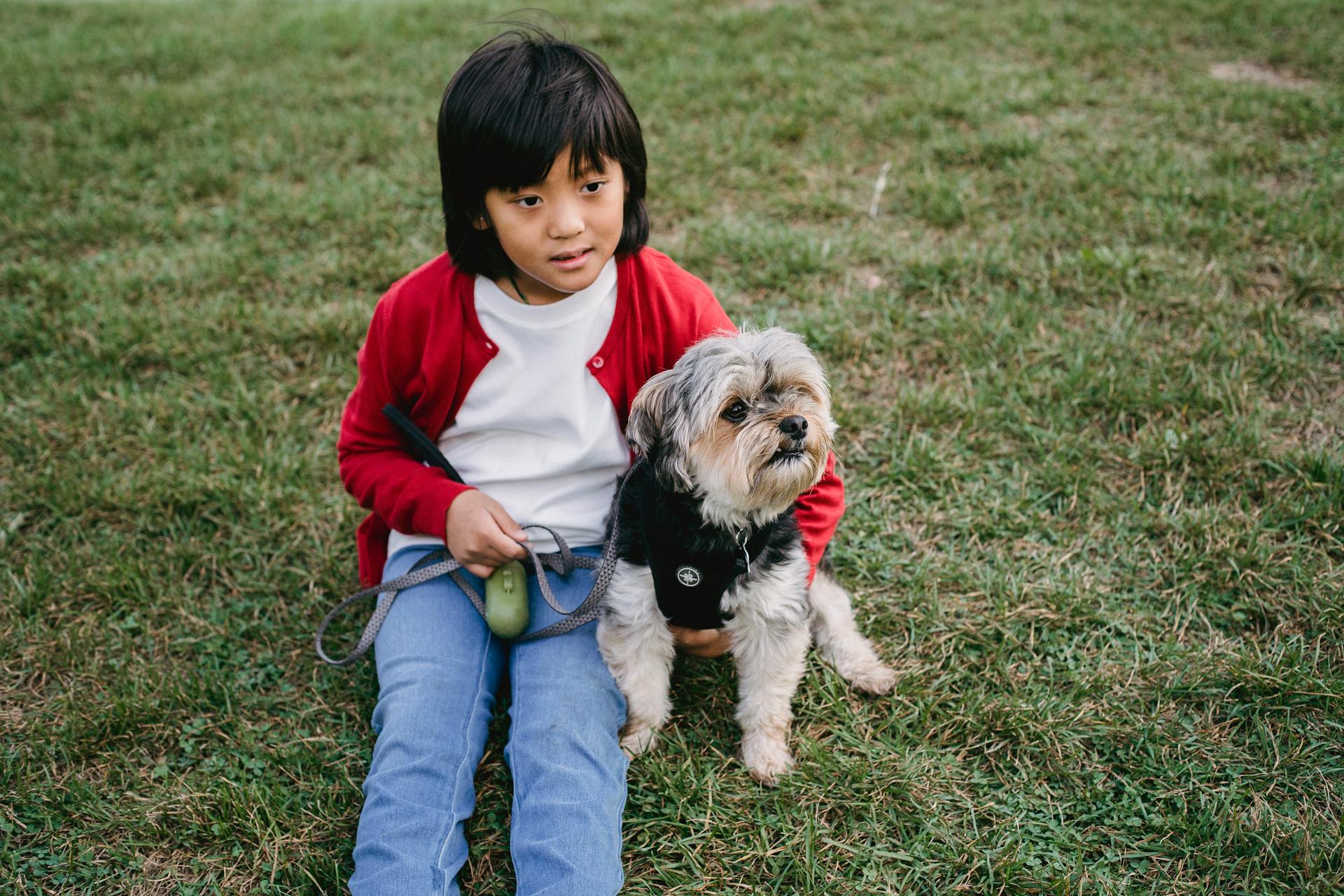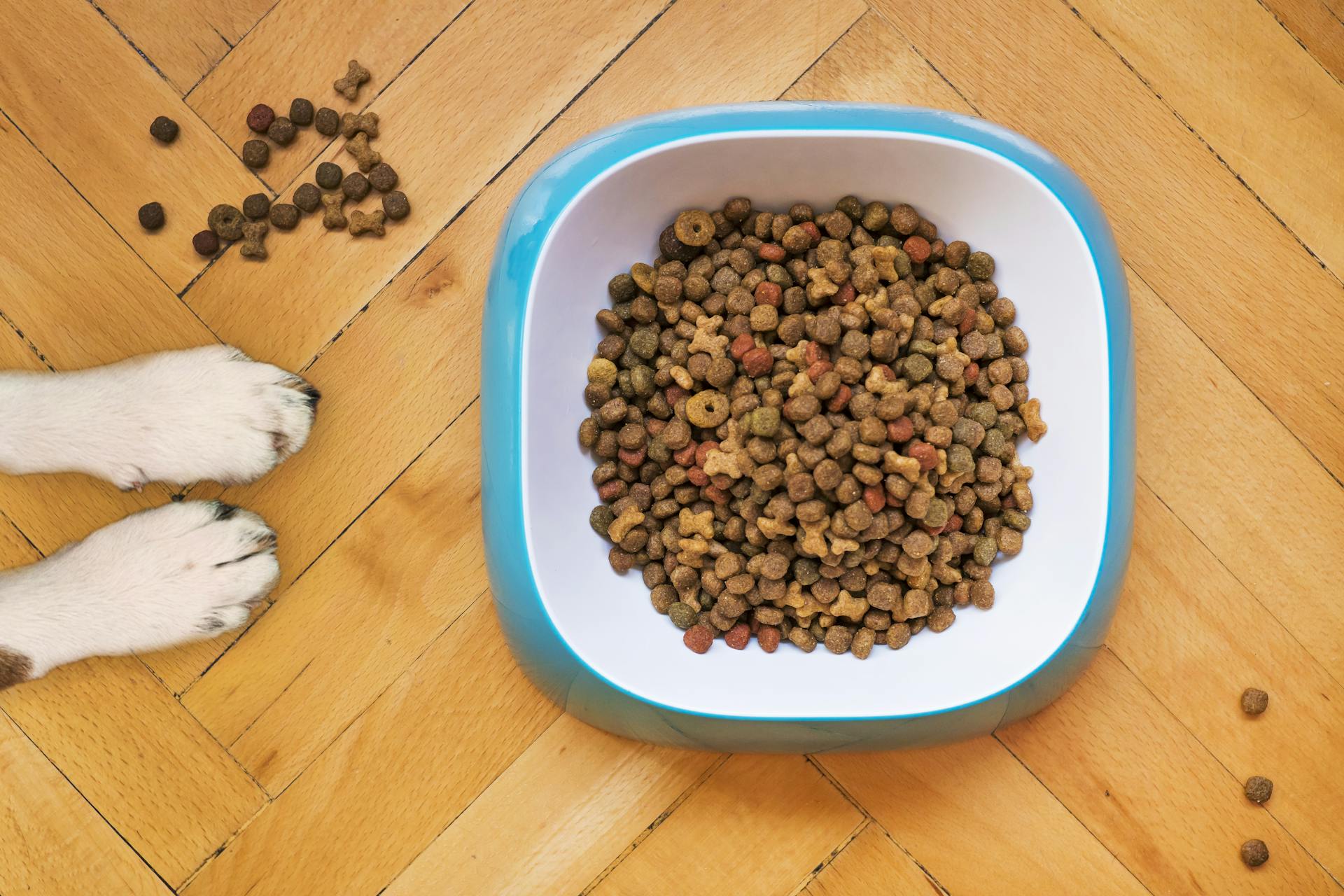
Yorkshire Terriers can be prone to constipation due to their small size and delicate digestive system. This can lead to painful bowel movements and potentially serious health issues if left untreated.
A common cause of constipation in Yorkshire Terriers is eating dry food that is too low in fiber. This can make it difficult for them to pass stool, leading to constipation.
Some signs of constipation in Yorkshire Terriers include straining during bowel movements, hard or dry stools, and a decrease in appetite. If you notice any of these symptoms in your pet, it's essential to seek veterinary attention.
Regular exercise and playtime can help stimulate bowel movements in Yorkshire Terriers and prevent constipation.
Causes and Symptoms
Yorkshire terrier constipation can be a real challenge for both you and your pup. Stomach problems in Yorkies can present in many different ways, depending on the cause of the problem and the individual dog.
Nausea, vomiting, diarrhea, constipation, and abdominal discomfort are all possible signs that your Yorkie might be dealing with stomach issues. A gassy or gurgly stomach can also be a sign that something is amiss.
If your Yorkie is constipated, you might notice that they're straining to poop, or passing small amounts of hard poo. You might even see matted feces, grass particles, string, or other objects in or around the anus.
Constipation in dogs can be caused by a number of factors, including not drinking enough water, not eating enough fiber, and a low-quality diet. Intestinal parasites, such as roundworms, can also cause constipation, as can intestinal blockage, joint issues, and spinal problems.
Here are some common causes of dog constipation:
- Not drinking enough water
- Not eating enough fiber
- Low-quality diet
- Intestinal parasites, such as roundworms
- Intestinal blockage
- Joint issues
- Spinal problems, such as intervertebral disc disease (IVDD)
- Prostate enlargement
- Anal gland issues
- Medications, such as diuretics
- Anesthesia medications
- Endocrine disease, such as hypothyroidism
- Megacolon (muscles of the colon dilate and become ineffective at moving stool through)
If you suspect your Yorkie is constipated, it's essential to schedule a veterinary appointment for proper diagnosis and treatment.
Diagnosis and Treatment
Diagnosis of Yorkshire Terrier Constipation typically involves a thorough history to gain insight into your pup's normal bowel habits and factors that may contribute to the current situation. Your veterinarian will ask when your dog last defecated, details about the appearance of the feces, and if your dog is straining to defecate.
If this caught your attention, see: Cool Yorkie Dog Names
A thorough physical exam, including abdominal palpation, will be completed to check for signs of discomfort or swelling. If your vet suspects your dog is constipated, they may perform tests to determine the underlying cause, such as X-rays, fecal float, orthopedic exam, rectal exam, or blood work.
The treatment for Yorkshire Terrier Constipation depends on the underlying cause, and may involve increasing water consumption, adding fiber to their food, or switching to a high-quality diet. In severe cases, dogs may need to be hospitalized while receiving treatment, or surgery may be necessary if the dog has eaten something that is stuck in the intestines.
Here are some possible treatments for Yorkshire Terrier Constipation:
- Fluid therapy (given under the skin or through a vein)
- Switching to a high-quality diet, such as Hill’s Prescription Diet Gastrointestinal Biome
- Probiotic supplements, such as FortiFlora
- Anal gland supplements
- Enemas
- Manual removal of feces by a vet using a gloved finger
- Medications, such as lactulose or cisapride
- Deworming medicine, such as pyrantel pamoate
Veterinarian Diagnosis
Your veterinarian will ask detailed questions about your dog's history, including recent eating habits and any past problems with constipation or diarrhea.
They will want to know how long your dog has been experiencing symptoms and whether they have eaten anything unusual.
For another approach, see: How to Draw a Yorkshire Terrier Dog
A thorough physical exam, including abdominal palpation, will be performed to check for signs of discomfort or swelling.
Your veterinarian may also ask about your dog's eating and drinking habits, as well as any medications they are taking.
Diagnostic testing may include X-rays, fecal floats, orthopedic exams, rectal exams, and blood work.
Here are some common tests used to diagnose constipation in dogs:
- X-rays: To see the colon and determine if it is distended or if there are any abnormal objects or blockages present.
- Fecal float: To diagnose intestinal parasites that can contribute to constipation.
- Orthopedic exam: To assess your dog's hips and joints for underlying orthopedic disease.
- Rectal exam: To feel feces in the colon for abnormalities and to rule out prostate enlargement.
- Blood work: To identify underlying diseases, such as hypothyroidism, that can cause constipation.
If your veterinarian suspects an obstruction, they may recommend enemas to remove it, and fluids may be administered under the skin or intravenously to ensure good hydration to the intestinal tract.
Treatment of
Treatment of stomach problems in dogs depends on the cause, but often involves probiotics and prebiotics to restore the balance of the microbiome.
Probiotics can help alleviate symptoms, and may be given in the form of an anti-emetic injection to prevent nausea and vomiting.
In severe cases, dogs may need a stay in the hospital to receive intravenous fluids and other treatments, such as gastro-protectants and pain relief.
Recommended read: Are Yorkshire Terriers Good Pets

Medications like antibiotics may be given if a bacterial infection is present, or if symptoms are severe.
For constipation, increasing water consumption is often the first step in treatment. Adding a small amount of unsalted chicken broth to the dog's water bowl can help encourage drinking.
Fiber, such as canned pumpkin, may also be added to the dog's food to help soften stool and make it easier to pass.
In some cases, probiotic supplements like FortiFlora may be prescribed to help regulate the gut.
If the constipation is caused by an obstruction, enemas or manual removal of impacted stool by a vet may be necessary.
In severe cases, hospitalization may be required to administer fluids and other treatments.
Prevention and Management
Feeding your Yorkshire Terrier a high-fibre diet can help prevent constipation.
Ensure your dog has access to water at all times to prevent dehydration and hard stools.
Giving your dog bones can lead to constipation, so it's best to stick to chew toys.
Neutering your dog at an early age can also help prevent constipation by reducing the growth of the prostate.
If your Yorkshire Terrier is prone to constipation, your veterinarian may recommend a regular fiber or probiotic supplement to promote gut health.
Here are some additional tips to help prevent constipation in your Yorkshire Terrier:
Most cases of dog constipation resolve in a few days with treatment, but it's essential to follow your veterinarian's advice for a smooth recovery.
If surgery is required, it can take seven to 10 days or longer for the incision to heal and for your dog's gastrointestinal tract to start moving normally again.
Yorkie Upset Stomach Relief
If your Yorkie is experiencing an upset stomach, it's essential to provide a bland diet to help alleviate the discomfort. Small meals are best, as they're easier to digest.
You can also consider adding probiotics and prebiotics to their food to help regulate their digestive system. I've seen this work wonders for some Yorkies.
If your dog is constipated, there are a few things you can do to help. First, make sure to wear rubber gloves when dealing with their poo to avoid any potential health risks.
Before attempting to help your dog, check their temperature. If it's abnormally high or you notice blood on the thermometer, seek veterinary attention immediately.
If you can see a thread or string in the anus, don't pull it, as this can cause internal damage. Instead, gently seek advice from a veterinarian.
If you can see grass in the anus, carefully try to ease it out. And if poo is matted around the anus, trim it carefully with scissors, making sure to wash the area with warm, soapy water afterwards.
Soaking your dog's bottom in warm water before trimming can make the process less stressful for them.
Frequently Asked Questions
Why is my Yorkies poop hard?
A diet lacking in fiber or eating non-food items like hair or small objects can cause hard stools in dogs, including Yorkies. If you suspect your Yorkie's diet is the cause, consult with your veterinarian for personalized advice on improving their digestive health.
How often does a Yorkie need to poop?
Yorkies typically poop 2-4 times a day, depending on their diet, age, and health. Factors such as fiber intake and eating frequency can influence their individual pooping schedule.
How much pumpkin to give a constipated Yorkie?
For a constipated Yorkie, add 1 to 4 tablespoons of pumpkin per meal to their diet to help ease mild constipation. Consult with a veterinarian for proper dosage and to rule out underlying health issues.
How long can a Yorkie go without pooping?
For a healthy Yorkie, 48 to 72 hours without pooping is generally not a cause for concern, but it's always best to consult a veterinarian if your dog's bowel movements are delayed
What food will help a dog poop?
Adding 1-4 tablespoons of 100% pumpkin puree to your dog's meal can help ease constipation and diarrhea.
Sources
- https://www.raisedrightpets.com/blog/yorkie-stomach-problems/
- https://www.vets-now.com/pet-care-advice/constipation-in-dogs/
- https://www.petmd.com/dog/symptoms/dog-constipation-causes-and-treatment
- https://www.animergevets.com/site/blog/2020/12/21/constipation-dogs-causes-symptoms-treatment
- https://cvets.net/what-do-i-do-when-my-dog-is-constipated/
Featured Images: pexels.com


